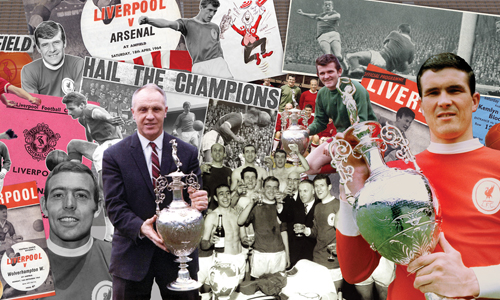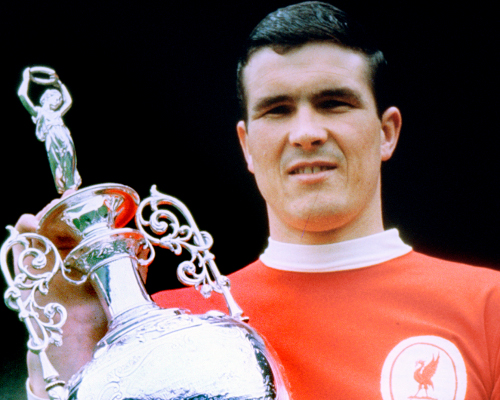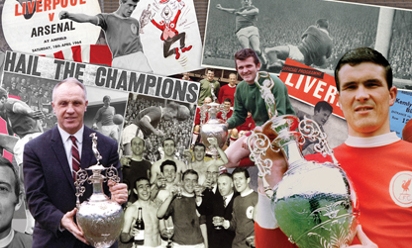The story of Bill Shankly's first title
It was in 1963-64 that the nation first awoke to the sound of Bill Shankly's red army.

After more than a decade in the football wilderness, a sixth league championship success confirmed the club's return to the big time and sparked the start of an unprecedented dominance of the game.
The transformation under Shanks had been remarkable and, on the eve of the season, he made a bold promise to the club's shareholders that the championship would soon be back at Anfield.
Roger Hunt shared his manager's confidence: "After getting promotion in 1961-62, then doing well in both the league and cup the following season, we were confident that we were good enough to win something this time around."
Excitement among Liverpudlians intensified as the big kick-off approached and on the opening day of the campaign they travelled to Blackburn in massive numbers. A sea of red and white swarmed over Ewood Park and they cheered the team to an encouraging 2-1 start.
Two successive home defeats quickly dampened spirits at Anfield, where the new Kemlyn Road stand had recently been opened, and, as Ron Yeats recalls, was proving something of a jinx.
"The new stand meant more comfort for the fans but it meant they were further away from the pitch, and the old intimate atmosphere seemed to be lost," said Yeats. "This 'new look' Anfield looked different and unconsciously, I think, our players felt as if they were playing on a strange pitch."
Just one win and a draw from their opening four games was not what Shanks, or indeed the supporters, had anticipated and pre-season optimism was in danger of falling flat with only a fortnight of the campaign gone.
Impressive victories away at Chelsea and Wolves eased the tension but, following yet another home defeat against West Ham in mid-September, the doom merchants were predicting a return to Division Two.
It was after the Hammers match that Shankly famously told the club's directors: "Gentlemen, I assure you that before the end of the season we will win a game at home."
After training on the following Monday morning, the boss gathered his troops together at Anfield and sat them down for a heart-to-heart discussion in a bid to root out the problem. It emerged that the players were overanxious to do well in front of their own fans and Shanks also detected a distinct lack of confidence running through the side.
An inspirational pep talk from the original 'Mr Motivator' did the trick. That night, the Reds went out and crushed Wolves 6-0 at Anfield to bury their home jinx and re-ignite their season. Anfield became a fortress. Only two more games were lost there and Stoke City, Sheffield United and Ipswich Town were all hit for six as Liverpool ran into top form.
Perhaps the most satisfying of victories that season came at Anfield on September 28, when Everton, the reigning league champions, were defeated 2-1.
Boosted by victory in the derby, Liverpool embarked on an impressive run that saw them rise to the First Division summit. The country began to sit up and take notice and when Yeats headed home the only goal of the game - his first for the club - away at Manchester United in November, Shankly's men were deemed genuine contenders for the title.

An ankle injury sustained by Jimmy Melia prompted Shanks into a major reshuffle. Ian St John was pulled into a more withdrawn midfield role and his place alongside Hunt was handed to Alf Arrowsmith. It proved a tactical masterstroke. St John excelled in his role as playmaker, while Arrowsmith took opposition defences by storm - blasting 15 goals in 20 league games.
The title charge really kicked in over the Easter period. A 2-0 win at bogey side Leicester was sandwiched between a memorable double over league leaders Tottenham, and it put Liverpool in pole position at the top.
"We virtually won the league over Easter," recalls goalkeeper Tommy Lawrence. "It was a great side. Very well balanced. I think our strength was that all the lads got on so well with each other, on and off the pitch.
"We all played for each other and the team spirit was fantastic. After winning those three games there was no stopping us. We were so confident then that we felt we could beat anyone."
Fittingly, the Reds were crowned kings of English football for the sixth time in their history on the afternoon of the final home game against Arsenal. Five goals flew past ex-Red Jim Furnell in the Gunners goal, while at the opposite end Lawrence capped a fine season by saving a penalty from George Eastham.
The seething crowd was in carnival mood and the Kop choir basked in the glory of Liverpool's success by treating the BBC cameras to a full repertoire of their favourite hits, from 'She Loves You' to 'When The Reds Go Marching In'.
A crescendo of noise engulfed Anfield as the players embarked on their victorious lap of honour. 'Ee-aye-addio we've won the league' bellowed around the ground. Anfield had never witnessed such scenes of jubilation.
Shankly had delivered his pre-season promise. From Second Division mediocrity to league champions in the space of less than five years was an almighty achievement, but the inspirational Scot modestly diverted the plaudits.
"Liverpool's triumph is no one-man affair," he said. "My training and coaching staff have done a wonderful job. Every man in our organisation has been taught the importance of looking after the small things. From the boardroom to the groundsman, every cog in the machine has functioned perfectly. Everyone has given 100 per cent effort."
The championship had been secured with three games left to play. With the Kop providing the perfect soundtrack to the success on the pitch, it had been an unforgettable campaign. European football beckoned for the first time and a glorious era at Anfield had begun.



